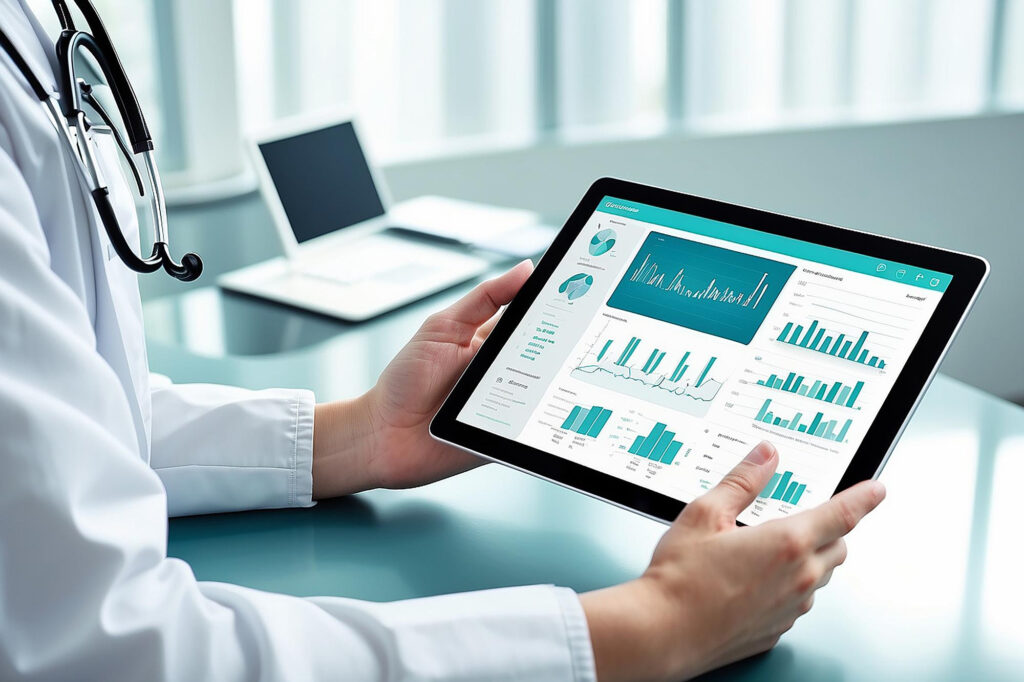A crucial step in clinical research is clinical data management (CDM). It involves generating high-quality, dependable and statistically sound data from clinical trials. Clinical data management makes sure that data is gathered, merged and made available at the right cost and quality. CDM also facilitates the execution, oversight and analysis of research studies spanning the entire breadth of clinical research outlined by the National Institutes of Health (NIH). The primary objective of CDM is to validate that research findings are well-founded on the data. Reaching this objective will safeguard public health and boost trust in marketed therapeutics.
Importance of Data Management in Clinical Trials
Clinical trials serve as the foundation of medical advancement, opening avenues for novel drugs and therapies. Yet, the pivotal element determining their success is data. The presence of high-quality, precise and comprehensive data is paramount for deducing dependable conclusions regarding the effectiveness and safety of new treatments.
Clinical Data Management (CDM) steps in as a crucial component in this process. CDM encompasses the systematic approach of gathering, refining, storing and assessing data produced throughout a clinical trial. It upholds data integrity from the commencement of patient enrollment to the conclusive analysis.
Fundamentals of Clinical Data Management
Effective clinical data management (CDM) necessitates a multifaceted strategy. At its essence, it includes:
- Designing Case Report Forms (CRFs): CRFs are standardized data gathering instruments used during clinical trials. Masterful clinical data managers (CDMs) ensure that CRFs are clear, succinct and contain all relevant information.
- Building Robust Databases: Clinical trial data is stored in electronic databases. CDMs collaborate with specialists to create and manage secure, efficient databases for storing this critical information.
- Implementing Quality Control Measures: Data accuracy is critical. CDMs create and manage data cleaning and validation processes to detect and correct mistakes or discrepancies.
- Regulatory Compliance: Clinical studies are subject to stringent restrictions. Masterful CDMs comprehend these standards and guarantee that all data gathering and management techniques follow applicable guidelines.
By focusing on these basics, CDM professionals ensure the reliability of clinical trial data, which in turn supports the advancement of safe and efficient new therapies.
Data Collection and Validation
Database Design and Maintenance
Any successful project must have a solid basis and clinical trial data management is no different. This foundation is built upon a well-thought-out and carefully managed database. Here’s how skilled (CDMs) tackle this crucial task:
- Data Modeling: They work along with biostatisticians and other stakeholders to create a database schema that effectively collects all pertinent trial data points and patient information. This schema makes sure that the data is consistently and logically arranged, making it easier to retrieve and analyze.
- Data Entry and Cleaning: To reduce errors and inconsistencies, CDMs set up explicit protocols for data entry. Additionally, they employ data cleaning procedures to find and fix any mistakes that might evade detection. This could entail using data validation software, cross-referencing with source documents and range checks for data values.
- Data Security and Access Control: Patient privacy is crucial when it comes to data security and access control. Strong access controls are in place to limit access to only authorized workers and proficient CDMs guarantee that databases are safe. To prevent data loss, they also put data backup and recovery processes into place.
- Database Maintenance and Version Control: Databases are dynamic systems. Data definitions and collection techniques may change during the process. Proficient CDMs carefully record these modifications and apply version control protocols to guarantee data accuracy and streamline historical analysis.
By meticulously designing, maintaining and securing the clinical trial database, CDMs uphold the reliability and accessibility of data for analysis, thereby contributing significantly to the trial’s success.
Skills and Expertise Required
Clinical data management is a broad field that calls for a special combination of technical expertise, meticulous attention to detail and regulatory framework knowledge. Here’s a closer look at the key skills and expertise sought after in masterful CDMs:
Technical Proficiency
- Comprehensive Understanding of Clinical Data Management Systems (CDMS): These platforms are the backbones of data administration, storage and collecting. CDMs with mastery levels are adept at making the most of these mechanisms.
- Knowledge of Data Cleaning Methods: Data cleaning is the process of finding and fixing mistakes in data that has been gathered. Competent CDMs have the knowledge and resources needed to efficiently clean and validate data collections.
- Data Standards and Regulations Understanding (e.g., ICH GCP): Clinical trials adhere to specific guidelines for data collection and management. Proficient CDMs are well-versed in pertinent regulations like ICH GCP (International Council for Harmonisation of Technical Requirements for Pharmaceuticals for Human Use Good Clinical Practice) to ensure trial compliance.
Attention to Detail and Accuracy
The precision and comprehensiveness of the data are critical to the outcome of a clinical trial. Expert CDMs are meticulous and unwavering in their dedication to maintaining data integrity. They conduct quality control procedures, carefully examine data for irregularities and take the initiative to find and fix any inaccuracies.
Regulatory Knowledge
Regulatory compliance serves as a fundamental aspect of ethical clinical research. Expert Clinical Data Managers (CDMs) possess a deep comprehension of the relevant regulations governing data collection, management and reporting in clinical trials. They actively monitor regulatory changes to uphold compliance throughout the research process.
Best Practices in CDM
Quality Clinical Data Management (CDM) extends beyond mere data collection and storage. Proficient CDMs adopt a set of best practices to promote data quality, enhance workflows and encourage collaboration during the trial phase. The following are key areas where best practices excel:
Quality Control Measures
Data integrity stands as a top priority in clinical trials. Skilled CDMs institute a robust quality control program to verify data accuracy and completeness. This program may encompass:
- Double Data Entry: Essential data points are recorded twice by different individuals to detect and correct any discrepancies.
- Data Range Checks: Defining specific ranges for data values (e.g., age, blood pressure) assists in spotting potential errors during data entry.
- Data Validation Rules: Incorporating automated checks into the CDMS aids in highlighting inconsistencies or missing data.
- Regular Data Reviews: Scheduled data evaluations by seasoned professionals help pinpoint and resolve any arising data quality concerns.
By implementing these practices, proficient CDMs reduce errors and maintain accurate data representation in clinical trials.
Collaboration with Other Stakeholders
Clinical trials require teamwork. Proficient CDMs value fostering transparent communication and collaboration with various stakeholders, including:
Investigators: They oversee the trials at each research site, ensuring accurate completion of CRFs and consistent data collection across all sites through effective communication.
Sponsors: They provide funding for the trial and are invested in data quality. Regular updates keep sponsors informed about data collection progress and potential challenges.
Data Analysts: They will analyze the collected data to draw conclusions about the treatment. Clear communication ensures data is collected and stored in a way that facilitates efficient analysis.
Masterful Clinical Data Managers foster collaborative partnerships to create an environment where everyone works together to ensure the trial’s success.
Case Studies of Successful Data Management
Real-world examples are impactful tools to demonstrate the effectiveness of Clinical Data Management (CDM). This section will showcase case studies illustrating the positive outcomes achieved through proficient data management practices.
Examples Showcasing Effective CDM Practices
Here, you will find detailed case studies showcasing the importance of effective CDM. Each study will outline the clinical trial, the data management challenges faced and how skilled CDMs utilized best practices to overcome these obstacles and guarantee the trial’s success.
Case Study 1:
A university clinical trials unit (CTU) needed a unified platform for clinical data management that could support a smaller team. They decided to swap its manual, in-house clinical trial system with a modern software-as-a-service (SaaS) solution. A randomization and trial supply management (RTSM) initiative from a SaaS and data analytics solutions provider was chosen to streamline the university’s clinical trials.
Outcome:
- The university successfully transitioned its paper and manual processes to 100% electronic data capture.
- The vendor offered a robust platform to manage data from the RTSM initiative and make it available to team members.
- The provider’s unified platform also helped the university speed up their COVID-19 studies to get treatments into patients’ hands quicker.
Case Study 2:
A therapeutics company needed help screening patients for their cancer clinical trials due to unpredictable eligibility criteria and manual patient screening methods. Manual efforts, like communicating with clinical research sites via email and non-documented phone calls, led to process errors and clinical trial enrollment challenges. A study build model that includes several applications from a CDM solutions provider were offered to the therapeutics company. It aimed to provide necessary flexibility and control to improve operational performance and clinical trial data quality.
Outcome:
- The solutions helped the company implement a new process for screening patients.
- Also, the company was able to standardize its study build operations in a central location to promote consistency and reusability across teams.
- Moreover, improved risk-based monitoring approaches have led to better decisions, increased clinical trial data quality and lower costs associated with monitoring visits.
By including real-world examples of successful CDM, you can provide companies with a tangible understanding of the value a masterful CDM professional brings to the table.
Conclusion
To sum it all up, developing clinical data management skills is essential to conducting effective clinical trials. Skilled CDMs protect the integrity of research and open the door to the creation of life-saving therapies by putting a high priority on data quality, regulatory compliance and teamwork. Building a team of skilled CDM professionals is an investment in the future of healthcare.
Staffing Made Effortless. Let the Experts Handle Your Hiring
Helping companies discover the perfect talent for their needs. Finding the right individuals to drive your success is what we excel at.





